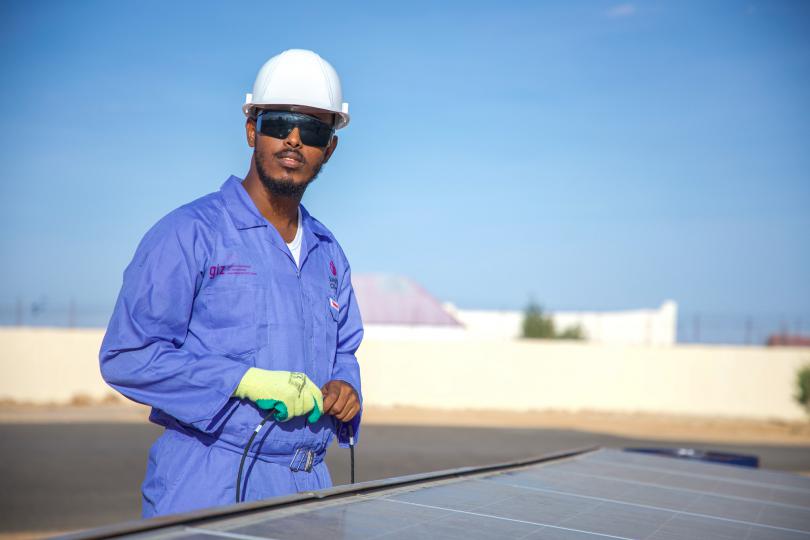SOLAR ENERGY PROVIDES SOMALI YOUTH SUSTAINABLE LIVELIHOODS

There is a big difference in my life when I compare before and after the training. I used to stay at home and dropped out of the school. I had dreams that were hard to achieve, and I didn’t have the skills to work. But now I’m equipped with a valuable skill that can help me achieve my dreams.
These were the hopeful words of Luul, 23-year-old Somali young woman who dropped out of school in 7th grade as she was not able to pay her school fee. Her story represents the journey of many young people in Somalia who do not have a formal skill to work-- many of them drop out of school due to conflict or lack of financial means to earn a university degree that can help them gain skills. However, Luul’s story represents the transformative impact of equipping youth with sustainable technical skills. Luul’s fortunes turned around when she joined a free solar energy training program helping disadvantaged young people in Somalia implemented by Save the Children.
I was excited to get the opportunity to learn this skill. After dropping out, finding work seemed impossible without experience or a degree from a university.”
In 2022, while living with her sister, Luul met with a friend who was taking a solar training course at an institute in Garowe, Puntland, and that piqued her interest. After some research, she saw the possibility of having a skill that could help her gain work and might help her resume her studies. Luul was thrilled and excited to start the six month training course.
One of my biggest ambitions at the moment is to work in the field of renewable energy and earn my living and education costs for my four younger siblings back home. I don’t want them to miss school just like me over financial circumstances.
I researched and asked about the skills, its importance and value - and surprisingly, it is quite valuable, and I was excited to get the opportunity to register and learn it.
The cost of electricity is very high in Somalia, and many families do not have access to electricity, making renewable energy a powerful solution to reduce costs and increase access to electricity to low-income families. For Luul, this energy transition has created opportunities for her and many young skilled solar technicians.
I believe that the training has come at the right time, that the local community needed it very much considering (it allows) access to affordable clean energy, and the youth can now get job opportunities after benefiting from the course.”

However, the fishing proved to be a struggle. Mohamed found himself unemployed with no certificate. Mounting life challenges including unemployment, pushed Mohamed to leave his hometown for Garowe district. In 2021, he arrived in the city seeking new skills and job opportunities to change his life and support his family.
“I have struggled with fishing, but I did not have the knowledge or skill to find different job in my hometown at the time. I moved to Nugal with no place to stay, no job in place or even skill or certificate I could work with but with only one plan in my head – to get a job.”
“I knew I needed skills to find job, so I started looking for schools or institutes that I could afford and learn some skills. One day, I was meeting some friends and they mentioned a social media post about an institute that was giving free solar training installation course. I was happy to hear that and I went there and registered.”
For both Luul and Mohamed, who have faced challenges to complete formal education and get employment without credentials, vocational training programmes offer a better life and job prospects. They see it as a valuable chance to gain skills in growing renewable energy sector.
Luul says: There is a big difference between my life before and after the training...I was just a stay-at-home school dropout with dreams that were hard to achieve and no knowledge of solar power, but now I’m equipped with a valuable skill that can help me achieve my dreams.”
Save the Children, in collaboration with the Puntland Ministry of Labour, Youth and Sports and funding from Deutsche Gesellschaft für Internationale Zusammenarbeit (GIZ) has trained a total of 140 youth in Puntland, including Luul and Mohamed.
The 6-month curriculum focused on hands-on practical learning of solar energy installation and maintenance skills. Participants also built entrepreneurial abilities to start renewable energy businesses. The program enabled inclusive access by covering all transportation, safety gear, and equipment costs and providing a stipend to help the young people get the things they needed while studying.
As technical training expert, Mr. Abdi Dek Abdirahman explained: "Our goal is to provide affordable, accessible skills training to young people struggling to find work and support their families. We believe everyone deserves a chance to succeed, and that targeted skills training is key to unlocking opportunities and transforming lives."
Beyond technical training, the project also helped graduates establish their own small solar businesses by providing start-up tool kits and linking them with potential employers. This is helping young entrepreneurs become self-sufficient while creating job opportunities for others.




